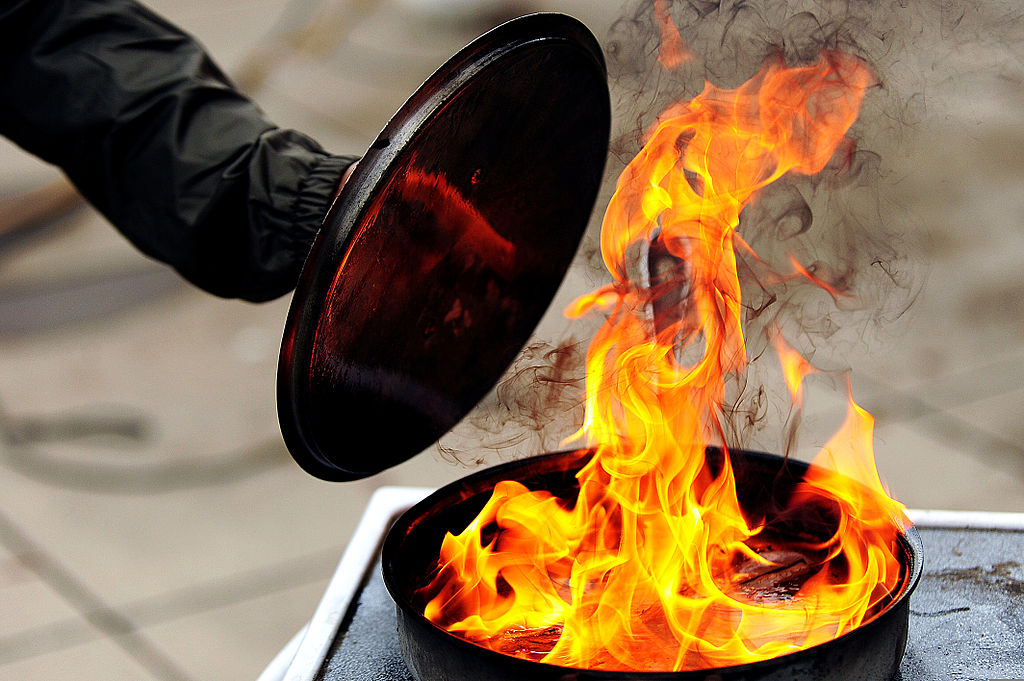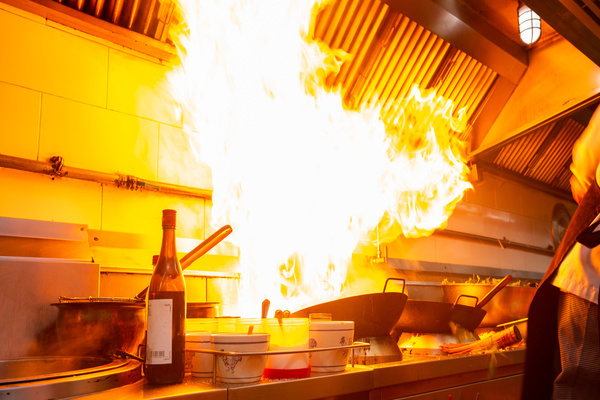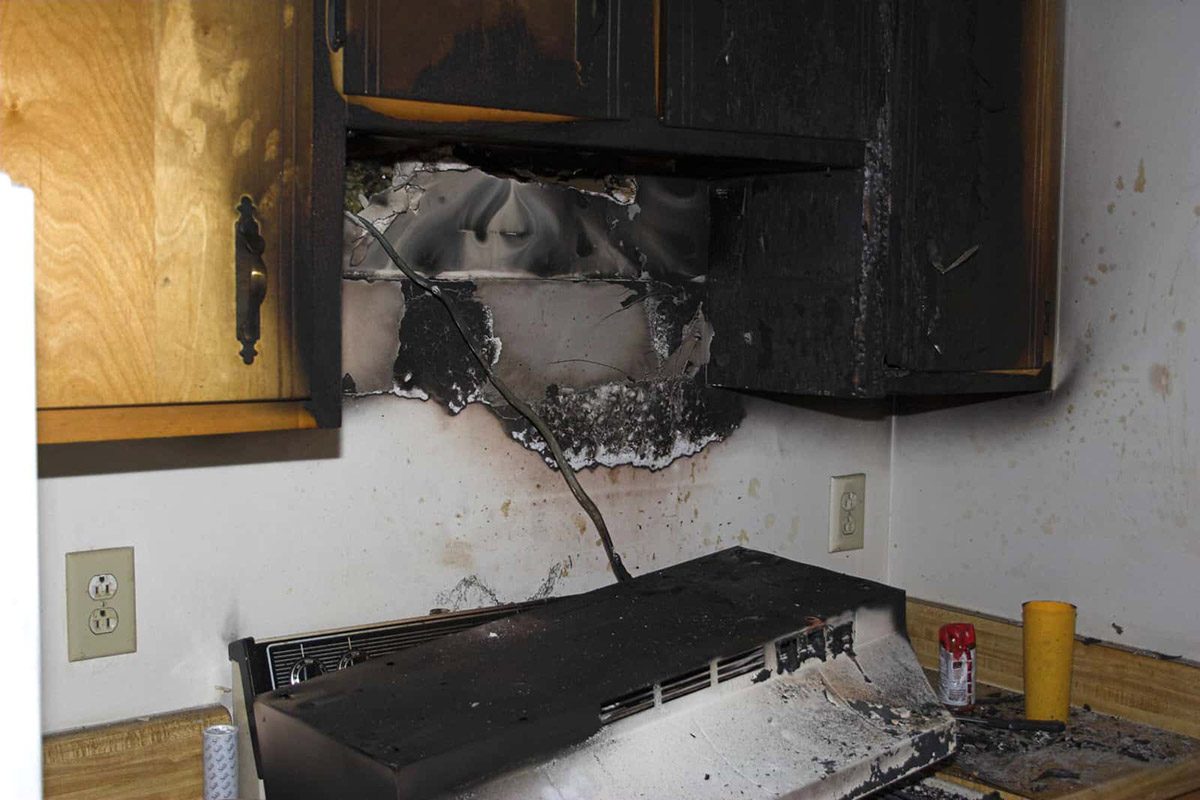
What Is a Grease Fire?
A grease fire occurs when cooking oil or fat becomes too hot and ignites. This can happen when the oil overheats in a pan or if a flammable object (like a towel or wooden utensil) comes into contact with hot oil. Grease fires are extremely dangerous because they can spread rapidly and cause severe burns or extensive damage to your home. Knowing how to react quickly is critical in minimizing harm.
Grease fires are most common in kitchens, especially when frying foods or cooking with high-fat oils such as vegetable oil, butter, or lard. They are also dangerous because water should never be used to extinguish a grease fire, which is the natural instinct for many people in the event of a fire.
How to Safely Put Out a Grease Fire
If a grease fire starts in your kitchen, stay calm and follow these expert steps to safely extinguish it:
| Step | Action |
|---|---|
| 1. Turn Off the Heat | The first thing you should do is turn off the heat source immediately. This will stop the oil from continuing to heat up and help prevent the fire from spreading. Never attempt to move the pan, as this can cause the hot grease to splash and spread the fire. |
| 2. Cover the Fire with a Metal Lid or Baking Sheet | If the fire is small and contained in a pan, carefully place a metal lid or baking sheet over the pan to smother the flames. This will cut off the fire’s oxygen supply and cause it to die down. Never use a glass lid, as it could shatter from the heat. |
| 3. Use Baking Soda or Salt to Smother the Fire | If the fire is still small and manageable, you can pour baking soda or salt directly onto the flames to smother them. Both substances absorb heat and help to cut off the fire’s oxygen supply. Never use flour or other powders, as they are combustible and can make the fire worse. |
| 4. Use a Class B Fire Extinguisher | If you have a Class B or multi-purpose (ABC) fire extinguisher on hand, you can use it to extinguish the fire if other methods don’t work. Stand back at least 6-8 feet from the flames and aim at the base of the fire, sweeping side to side until the fire is out. Only use a fire extinguisher if the fire is small and contained. If it grows out of control, evacuate and call 911. |
| 5. Evacuate if Necessary and Call 911 | If the fire continues to grow despite your efforts to put it out, evacuate your home immediately and call 911. Do not attempt to fight a large fire yourself. Firefighters have the training and equipment necessary to handle kitchen fires safely. |
What NOT to Do During a Grease Fire

It’s important to avoid certain actions during a grease fire that can make the situation worse. Here’s what you should NEVER do if a grease fire breaks out:
1. Do Not Use Water
Never pour water on a grease fire. Water can cause the oil to splatter and spread the fire, and it can even cause the hot oil to explode. This can lead to more severe burns and a larger fire. Instead, stick to using baking soda, salt, or a fire extinguisher.
2. Do Not Use Wet Towels or Dishcloths
Although it may be tempting to try and smother the fire with a wet towel or dishcloth, this can make the fire worse. Wet cloths can cause steam, which can spread the fire or cause oil to splash. Always use a metal lid or baking sheet to safely smother the flames.
3. Do Not Move the Pan
Never attempt to move a burning pan. This can cause hot oil to splash onto you, your kitchen, or other flammable surfaces, spreading the fire and increasing the risk of injury. Leave the pan where it is and turn off the heat source.
How to Prevent Grease Fires

Prevention is key when it comes to avoiding dangerous grease fires. Follow these expert tips to reduce the risk of a grease fire in your kitchen:
1. Never Leave Cooking Unattended
The most important rule for preventing grease fires is never leave cooking food unattended. Grease can overheat and catch fire in seconds, especially if you’re deep-frying or using a large amount of oil. Always stay in the kitchen and keep an eye on your food when cooking with oil or grease.
2. Keep a Fire Extinguisher in the Kitchen
Always have a Class B or ABC fire extinguisher within easy reach of your kitchen. If a grease fire breaks out and other methods don’t work, a fire extinguisher can save lives and property by putting out the fire quickly. Make sure everyone in your household knows where the fire extinguisher is located and how to use it properly.
3. Use Oils with Higher Smoke Points
When cooking at high temperatures, choose oils with higher smoke points, such as canola or peanut oil. Oils with lower smoke points, such as olive oil or butter, are more likely to ignite when overheated. Understanding the temperature limits of your cooking oils can help prevent grease fires from starting in the first place.
4. Keep Flammable Objects Away from the Stove
Keep all flammable objects, such as paper towels, dishcloths, and wooden utensils, away from your stove when cooking. These items can easily catch fire if they come into contact with hot oil or grease. Make sure your kitchen is clear of unnecessary items while cooking.
FAQ
| Question | Answer |
|---|---|
| Can I use flour to put out a grease fire? | No, flour is flammable and can make the fire worse. Use baking soda or salt to smother a grease fire instead. |
| What should I do if the grease fire is out of control? | If the fire is growing or spreading, evacuate immediately and call 911. Do not attempt to fight a large fire yourself. |
| How can I prevent grease fires when frying food? | Never leave the stove unattended when frying, use oils with higher smoke points, and keep flammable objects away from the stove to prevent grease fires. |
| What type of fire extinguisher should I use for a grease fire? | Use a Class B or ABC fire extinguisher, as these are specifically designed to put out grease fires. |
| Can I put out a grease fire by moving the pan outside? | No, moving the pan can cause hot oil to splash and spread the fire. Keep the pan where it is and use baking soda, salt, or a metal lid to smother the flames. |
If your kitchen has suffered damage from a grease fire, contact Citywide Mold Mitigation for expert fire damage restoration services today.

